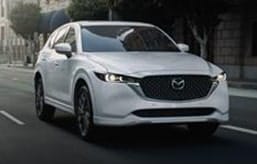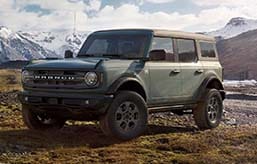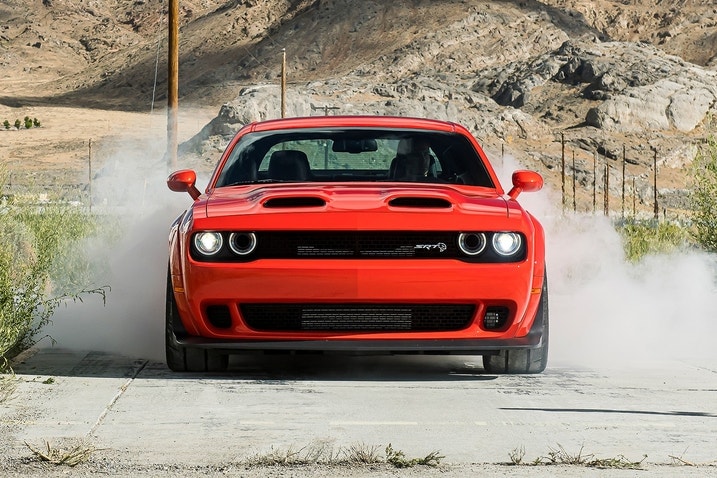- Dodge added a traditional gasoline Charger to its new electric lineup.
- The new base inline-six is more powerful than the old base Hemi V8.
- All-wheel drive is standard and selectable.
Dodge Charger Sixpack vs. Dodge Challenger: Muscle Car Specs Compared
How does the new gas-powered Charger stack up against the car it replaces?
Dodge phased out the legendary Hemi V8 in 2024, leaving its Challenger and Charger muscle cars looking for a new powerplant. The electric Charger Daytona came first, replacing both the two-door Challenger and four-door Charger with an all-wheel-drive behemoth of an electric vehicle. However, Dodge always had plans to bring its newest engine, a twin-turbocharged inline-six codenamed Hurricane, to the new Charger to satisfy those buyers holding on to gasoline power.
While the old Challenger came in a half-dozen or so trims, the new gasoline Charger only comes in two (for now): the R/T and Scat Pack, with the Scat Pack being the more powerful and faster of the two. Both it and the electric Daytona now offer two or four doors, again filling both holes in its hi-po lineup. With that in mind, and the specs below, we think buyers will have a hard time making a case for the late Challenger V8.
Edmunds | 2026 Dodge Charger Scat Pack | 2026 Dodge Charger R/T | 2023 Dodge Challenger R/T | 2023 Dodge Challenger R/T Scat Pack | 2023 Dodge Challenger Hellcat |
|---|---|---|---|---|---|
| Engine | twin-turbocharged 3.0-liter I6 | twin-turbocharged 3.0-liter I6 | 5.7-liter V8 | 6.4-liter V8 | supercharged 6.2-liter V8 |
| Horsepower (SAE hp) | 550 hp | 420 hp | 372 hp | 485 hp | 717 hp |
| Torque | 531 lb-ft | 468 lb-ft | 400 lb-ft | 475 lb-ft | 656 lb-ft |
| Transmission | eight-speed automatic | eight-speed automatic | manual or eight-speed auto | manual or eight-speed auto | manual or eight-speed auto |
| Four-wheel-drive system | standard | standard | N/A | N/A | N/A |
| Wheelbase | 121 inches | 121 inches | 116 inches | 116 inches | 116 inches |
| Overall length | 206.6 inches | 206.6 inches | 197.9 inches | 197.5 inches | 197.5 inches |
| Overall width | 79.8 inches | 79.8 inches | 85.4 inches | 85.4 inches | 85.4 inches |
| Overall height | 59.2 inches | 59.2 inches | 57.7 inches | 57.7 inches | 57.2 inches |
| Curb weight | 4,816 pounds | 4,816 pounds | 4,157 pounds | 4,223 pounds | 4,415 pounds |
| Cargo space | 22.7 cu ft (37.4 cu ft w/ seats down) | 22.7 cu ft (37.4 cu ft w/ seats down) | 16.2 cu ft | 16.2 cu ft | 16.2 cu ft |
The 2026 Dodge Charger Sixpack features a twin-turbocharged 3.0-liter inline-six for power, with even the less powerful standard-output (SO) version delivering 420 hp, far more than the old base Hemi V8. Stepping up to the high-output (HO) version gives buyers 550 hp, more than the previous Challenger SRT 392. However, as of now, there is no gas-powered Charger that matches the Hellcat’s 717 hp or anything above it.
For that, buyers would need to go electric, with the Daytona EV producing 670 hp but dispersing it to all four wheels. The Daytona can get to 60 mph in 3.3 seconds, to the Hellcat's 3.7 seconds. For the record, the new Charger Scat Pack Sixpack does the sprint in 3.9 seconds, according to Dodge.
The new Chargers weigh 400-600 pounds more than the old Challenger with the new ones coming in around 4,800 pounds and the old ones ranging from 4,200 to 4,400 pounds, making the sprint times even more impressive. The new electric Daytona comes in almost a half-ton more (5,767 pounds) than the new traditional Charger.
All-wheel drive is standard on the new Chargers, though they all feature a driving mode that sends power only to the rear wheels and all feature an eight-speed automatic with paddle shifters. If buyers want a manual, they’ll have to look in the used car market.
The previous Challenger and Charger were always big cars with lots of space for people and cargo, especially in the back seat. But the new Charger dominates here too, adding 30% more space in the trunk. And with the fold-down second row, the new model can now carry almost 40 cubic feet of stuff overall, including tall cargo that can be laid down.
The last Dodge Challenger R/T started at about $42,000 while the Scat Pack started at about $50,000. The new 420-hp Charger R/T has a base price of $51,990, including destination, with less power than the Challenger Scat Pack but with all-wheel drive. Driving a Challenger in northern states in the winter is a nonstarter.
Moving up to the new Charger Scat Pack, buyers get more power and torque and a better sprint time (and more cargo space) than the old version for about $5,000 extra. As we said, there’s currently no comparable gas Charger to go up against the Challenger Hellcat, especially in a straight line. But with space in the engine bay, and fans impatiently waiting to turn back the clock again, we wouldn’t be surprised to see another new Charger housing some version of that iconic V8. Until then, the new Charger Sixpack will provide Dodge buyers with the muscle car experience they still crave.






 by
by  edited by
edited by